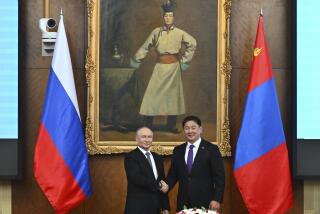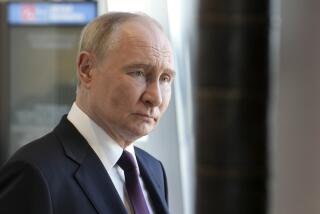Vladimir Putin
Newly acting Russian President Vladimir Putin arrived in Chechnya to hand out gifts to soldiers and sign autographs, requesting to occupy it as soon as possible (Jan. 2). After this war is over, will the Russian military announce that it is occupying the Baltic states?
How long will the World Bank and the United States hand billions of dollars to Russians for occupying independent countries and spilling innocent people’s blood?
VICTOR SESTOKAS
Los Angeles
*
Re Russian President Boris Yeltsin resigning, Jan. 1: So how come the Russians get all the luck on New Year’s Eve?
JAMES C. McHARGUE
Los Angeles
*
Maura Reynolds identifies the factors that make Russia’s democracy “nominal” instead of actual (news analysis, Jan. 1). Apparently, Russian democracy is threatened by the fact that “a few national media outlets, operated by no more than a handful of oligarchs” have an undue influence upon public opinion. In addition, public debate is plagued by smear campaigns, political alliances are determined by personal allegiance instead of ideology, and the people “dutifully go to the polls but don’t believe their vote matters.”
Does any of this sound familiar? In the U.S., just a handful of corporations run practically all of our major print and electronic media. Our style of sound-bite-ridden negative campaigning has proved so influential that we are exporting it to the rest of the world. And as the debates over impeachment and the nuclear test ban treaty showed, our statesmen’s public decisions often seem based on private antipathy.
On Reynolds’ analysis, it appears that the only difference between Russia’s “malleable” democracy and our stable one is that although Americans and Russians both feel their vote doesn’t matter, at least the Russians vote anyway.
DANIEL R. GOLUB
Granada Hills
More to Read
Sign up for Essential California
The most important California stories and recommendations in your inbox every morning.
You may occasionally receive promotional content from the Los Angeles Times.










